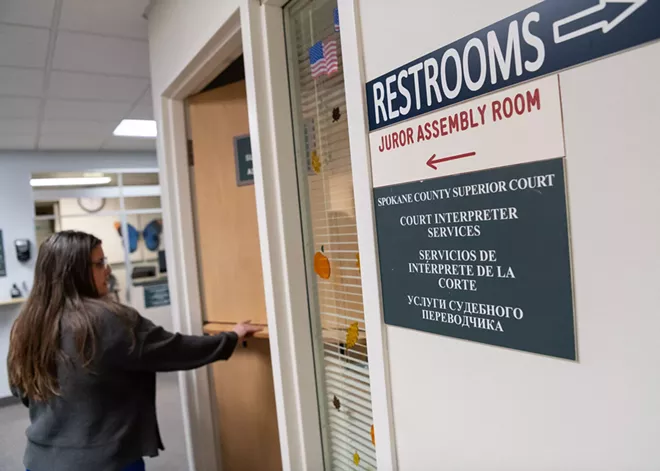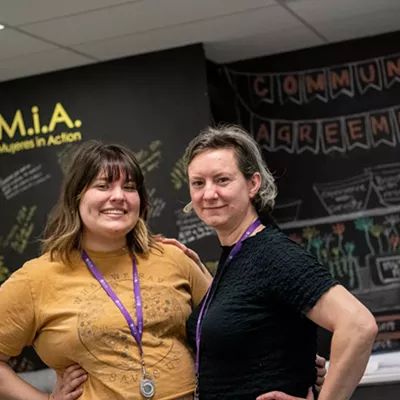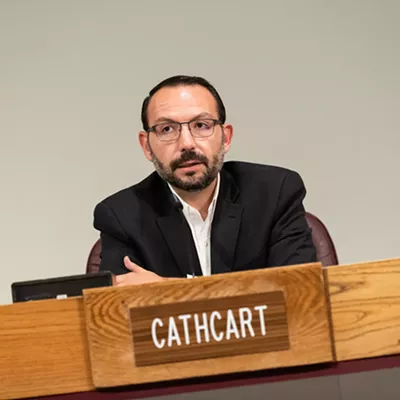Walk into the Spokane County Courthouse with only limited English proficiency and, if you're lucky, you might spot the dark green sign that tells you where to find interpreter services. It's up on the third floor, down a long hallway, technically in another building — the annex.
Of course, the sign would only help you start looking for the right office if you speak English, Spanish or Russian. And, before spotting it, you'd have to go through security, where all the directions are written in English, except for a single pictogram that makes it clear that guns aren't allowed.
The good news is, courthouse wayfinding and access to translators could soon get easier for people who primarily speak other languages because representatives from municipal, district and superior courts have been working together over the past few months to improve language access in their buildings on the Spokane County campus.
That's thanks largely in part to advocacy work by Mujeres in Action (MiA), a nonprofit that works with domestic violence and sexual assault survivors who primarily speak Spanish. For the better part of two years, the organization's dedicated staffers have been asking Spokane County leaders to implement a language access plan that's required by law. They've met with elected officials, court administrators and judges, and joined with dozens of other nonprofits to highlight issues with the current systems and to offer solutions.
One of the first major victories came earlier this year, when protection order forms were offered in other languages for the first time in Spokane. That makes it easier for victims requesting a restraining order involving domestic violence, stalking or other types of abuse to understand the questions they're being asked, although the forms ultimately still need to be translated into English before they're officially filed.
More recent progress started after Judge Jenny Zappone — a former deputy prosecutor who was elected to the Spokane County District Court bench last fall — took on the task of forming a language access committee this summer. The group has grown to include representatives from all three courts, which have started updating signage and providing materials for staff to ensure they're ready to help when someone needs an interpreter.
"Prior to becoming a judge, MiA had done a presentation on victims of crime and how they feel going to the courthouse. Not only do they need to feel seen and heard in the courtroom, it needs to start at the front doors of the building," Zappone says. "When I became a judge, it gave me a bigger platform to look at this."
Now, in addition to continuing improvements in the courts, the advocates are focused on pushing Spokane County as a whole to implement a language access plan. They say it's just as important for someone to be able to access an interpreter when they go to pay their property taxes, update their vehicle registration or access other county services.
After testifying to the county commissioners in other languages during public comment in May and June — highlighting the fact that about 40,000 county residents speak another language at home — it seems like the need really started to click for the elected officials, says Jesus Torres, MiA's political advocate and organizer.
"It just kind of brought more attention to it, and I think it made a big difference," he adds.
Indeed, at the same time Spokane was approving its own language access program in October, the five Spokane County commissioners started talking about what it might look like to provide better access throughout their government agency.
COURT ACCESS
The first focus for MiA has been improving access within the courts, where their clients might seek protection orders or other justice options. More than a year after the nonprofit started asking for better signs and training for staff, the language access committee launched by Zappone kicked that work into high gear.
By the end of this year, the goal is to have signs up welcoming people into the court buildings in multiple languages and letting them know where to ask for an interpreter. Security lines will also feature pictograms that make it clear what to do.
Zappone says she wanted to tackle the low-hanging fruit as soon as possible, understanding that if something doesn't work exactly right at first, it can be improved later.
"Our goal was to get something out there to make these baby steps, because if you want to think too big and make it perfect, it's never going to happen," Zappone says. "My goal was not to have meetings just to have meetings. It was to get some tangible product out there."
One of the most important things to come out of the committee is the communication between municipal, district and superior courts, enabling them to make changes that have been talked about for years.
"Everybody wants to make language access and access to justice a priority. It's just difficult when there's so many issues affecting our court system," Zappone says. "We've taken free resources and modified them, for little or no cost to the taxpayers. There are so many easy ways to fix things ... it just requires work and thought and someone doing it."
Zappone has also worked with District Court staff to create informational binders for community-facing employees. They include "I speak..." cards, which repeat the same phrase in dozens of languages, enabling someone to point at their language so the staff member knows what translation they need. They also include directions for calling an interpreter service — typically LanguageLine — and directions to fill out a report so each office knows what case the line was called for.
Superior Court will use the same materials, which are being tweaked to include that court's specific procedures. The plan is to get those to customer service staff this month.
That's important because advocates from MiA have been told repeatedly that translation is readily available, but that's not what happened when they tested the theory this spring. Speaking only in Spanish, MiA's Executive Director Hanncel Sanchez went to the interpreter's office, where staff scrambled, unsure of what to do, before calling another county employee who spoke Spanish, says Ana Trusty, the nonprofit's communications director.
"They told her they couldn't call an interpreter because it was a conflict of interest — there's no reason for that — so then they found somebody that spoke Spanish, and one of the first questions he asked was 'How did you get into this country? What's your legal status?'" Trusty says. "She said, 'I don't know why you're asking me that,' and he said, 'Oh, because it matters how the process will go, you need a lawyer.'"
That's not true, and it's illegal to ask someone's legal status in the courthouse, which is supposed to be a safe zone from immigration enforcement, Trusty says.
On other occasions, their clients were told to come back with someone who speaks English, Trusty says, noting that it's problematic to have a domestic violence victim's words translated by their abuser or one of their children, and the courts are legally obligated to provide an interpreter.
MiA brought those concerns to Superior Court Administrator Ashley Callan, who acknowledges that staff need more comprehensive training to use the resources available and prevent insensitive interactions.
"They pointed out to us that while we had a plan, we hadn't trained our staff as well as we should have," Callan says. "We need to do a better job at training our staff on other aspects of dealing with people — cultural sensitivity training, trauma-informed training, all of those important aspects of being here to serve."
Callan works with a group of court administrators around the state and hopes they'll create a statewide web-based training that can be repeated as necessary to refresh employees on what to do.
"The Spokane community is becoming more and more diverse each year, and we are behind," Callan says. "We need to improve."
She hopes that once the courts have adopted their wayfinding signs and other tools, other county offices will soon follow.
THE COUNTY PLAN
After hearing from advocates this spring, the county commissioners tasked Jeffrey McMorris, their community engagement and public policy adviser, with figuring out the language access needs in various departments.
In October, McMorris briefed them, noting that offices run by other elected officials (such as the auditor, clerk or treasurer) have their own needs. He also described some affordable options the county could put in place, such as digital directory kiosks and a translation tool that can write closed captions in other languages for the commission meetings.
McMorris says he asked county employees who speak other languages to provide feedback on the tool's captions, and while it was able to get major ideas across, it wasn't very accurate for specific translation. There are other options, however.
"I think there's definite interest in what AI and other technology could do," McMorris says.
In coming weeks, the commission may formally create a language access committee to work on a countywide plan.
"We need to make sure we're talking to the frontline employees who actually do the work, and not having management make a decision based on a perceived need," McMorris says.
For example, some offices might need video interpretation rather than a phone line, so staff can display documents or show something to the interpreter, McMorris says.
Commissioner Chris Jordan is helping push for that work.
"MiA's done a great job raising awareness about this issue," Jordan says. "I would always like to be moving faster, but it's important we bring this committee together to vet these ideas."
Until they see that happen, MiA and a coalition of 24 nonprofits will continue their email campaign calling for an official county language access plan. That signup can be found on their website en.miaspokane.org.
"It's exciting to see the small changes, and that we're actually affecting the system in some sort of way, even if it's frustrating," Trusty says. "Washington state does not have an official language, and federally the U.S. does not have an official language either. We are a multi-language country. So why not start thinking of everybody?" ♦


























